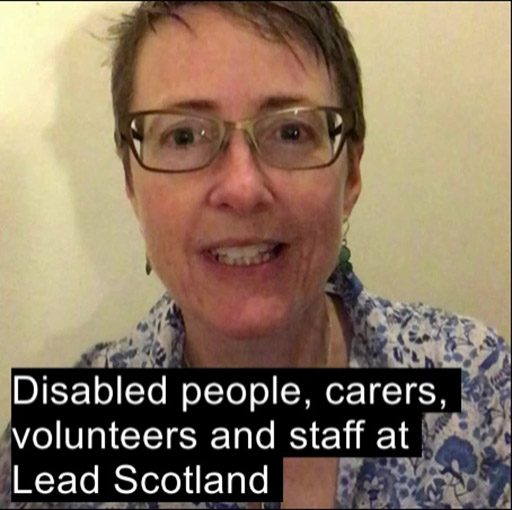Use 'Print preview' to check the number of pages and printer settings.
Print functionality varies between browsers.
Printable page generated Friday, 27 February 2026, 9:21 PM
Introduction
Introduction

Transcript
Welcome to Everyday computer skills: a beginner’s guide to computers, tablets, mobile phones and accessibility. This course is designed to offer people with varying abilities the opportunity to keep up with present-day trends. It will provide practical guidance for developing basic and essential digital skills in an accessible way. The course has been coproduced by Lead Scotland staff, volunteers, learners and befriendees in partnership with The Open University in Scotland.
Lead Scotland is a voluntary organisation set up to empower disabled adults and young people, and carers across Scotland to access learning opportunities. Our organisation understands the barriers to learning essential digital skills experienced by disabled people and carers. So, with funding from the Scottish Council for Voluntary Organisations Digital Participation Charter, we have been able to partner with The Open University in Scotland to create this course.
We worked with 29 disabled people to coproduce the content of the course. All participants completed a questionnaire to identify digital skills they had or did not have. Each participant was asked to suggest and comment on specific content they would like to see in the course and express their interest in any further involvement with the course content. Nine of the participants were happy to be involved further. The outline of the course content was guided by the UK government’s ‘Essential digital skills framework’. Lead Scotland’s Learning Coordinator and four volunteers, three of whom have identified as disabled, each worked on specific sections to coproduce and complete the whole course.
Information about computer and digital technology is extensive, ever-growing and too vast to capture in the six lessons of this course. However, the course is intended to equip you with the basics and hopefully give you the skills and confidence to explore other freely available information. Once you gain confidence in accessing online resources, you will be able to fill any missing gaps that this course may have for you. There will be gaps, because computing devices come in all shapes and forms, and can function in different ways. As new technologies develop constantly, each of us is a learner, whether we are a beginner or specialist in any of the numerous computing fields.
Accessibility information
This course has been optimised for accessibility and should be compatible with assistive software. On a small mobile screen it may not yet be fully mobile responsive so you might need to use pinch and zoom to increase the size of text on screen. On a
The course content is also available in a range of formats (
Lead Scotland has worked with a range of partners to develop alternative formats of online safety and security messages for people who might otherwise find them inaccessible.
You can choose from a range of alternative formats and languages in the list below or download them directly from Lead Scotland. We will also include them on the resources page for the relevant sections.
Text
- Structured text document – for use with assistive technology (Word document)
- Structured text document – for use with assistive technology (PDF)
- HTML
- Text in braille
- Text in large print
- Easy Read (in production)
Audio and video
- British Sign Language video clips (in production)
- English audio files
Languages
- Plik dźwiękowy po polsku (Polish Audio)
- Tekst polski (Polish Text)
- 普通话音频 (Simplified Chinese Audio)
- 简体中文文本 (Simplified Chinese Text)
- التسجيل الصوتي بالعربية (Arabic Audio)
- النص بالعربية (Arabic Text)
- ਪੰਜਾਬੀ ਆਡੀਓ (Punjabi Audio)
- ਪੰਜਾਬੀ ਟੈਕਸਟ (Punjabi Text)
- ਪੰਜਾਬੀ ਆਡੀਓ (Urdu Audio)
- اردو ٹیکسٹ (Urdu Text)
- Audio în limba română (Romanian Audio)
- Text în limba română (Romanian Text)
Getting started
After studying this course, you should feel equipped with digital skills that are important to function in the modern world. You will be able to:
- Use a computer and make it more accessible.
- Create your own files using Microsoft Word.
- Send and receive messages via email, Facebook, Twitter and Skype.
- Access and search the internet securely.
- Use online services such as shopping and banking.
- Stay safe and legal online.
Additional information
Do you consider yourself to be a complete beginner?
If you do, you may wish to go to the Additional information section first before starting on Lesson 1. This section explores the various parts of a computer and explains how the internet works as well as how to search online.
Additional information is divided into four sections:
Your computer hardware.
Adjusting your set-up.
How the internet works.
Searching on the internet.
However, if you already feel confident on the basics, you can skip Additionational information and go straight to Lesson 1.
We hope that you enjoy the course and benefit from signing up to other free courses once you have the digital skills, confidence and trust to go online and connect!
Key words and concepts are in bold. There is a course glossary you can refer to if any of these are unfamiliar to you.
Let’s get started with Lesson 1.
Acknowledgements
Except for third party materials and otherwise stated (see terms and conditions), this content is made available under a Creative Commons Attribution-NonCommercial-ShareAlike 4.0 Licence.
The material acknowledged below is Proprietary and used under licence (not subject to Creative Commons Licence). Grateful acknowledgement is made to the following sources for permission to reproduce material in this free course:
Every effort has been made to contact copyright owners. If any have been inadvertently overlooked, the publishers will be pleased to make the necessary arrangements at the first opportunity.
Banner image: The Open University
Introduction video: Lead Scotland